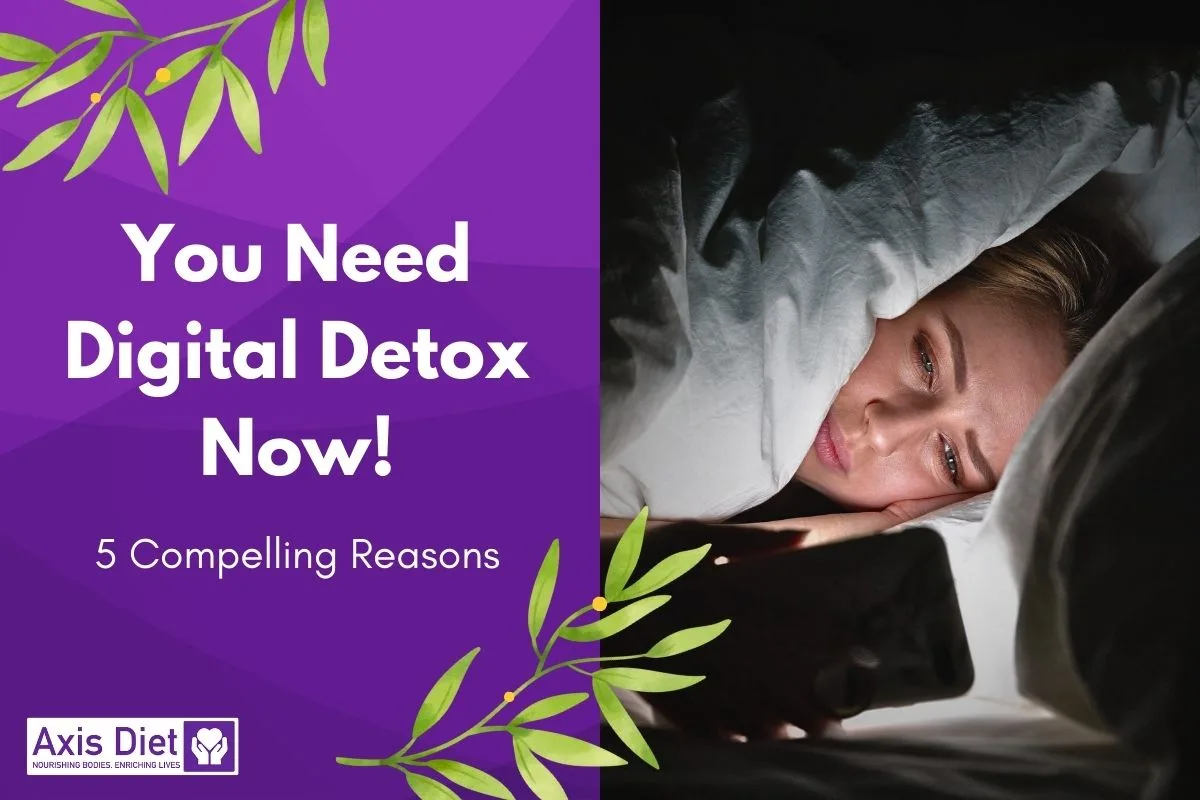In today’s digitally fueled world, it’s easy to underestimate the impact of our electronic devices on our overall well-being. As we strive to achieve holistic health, the importance of a digital detox becomes ever more apparent. At Axis Diet, we frequently discuss topics that nourish your body and mind through proper nutrition and lifestyle choices. In this article, we explore why a digital detox should be an essential component of your health routine.
1. Improved Mental Health: Beyond the Screen
Social media platforms and other digital spaces can act as both a social lifeline and a stress catalyst. While they offer avenues for creativity and connection, they can also be hotbeds for negative emotions, such as anxiety, depression, and stress. The pressure of keeping up with curated lives, coupled with the bombardment of global news and polarizing views, can significantly heighten cortisol levels. A digital detox serves as a refreshing mental palette cleanser, allowing you to recalibrate your mental state and cultivate emotional resilience. For further insights into how diet affects mental health, our article on the Gut-Brain Connection is a must-read.
2. Enhanced Productivity: The Focus Dividend
Modern professional life heavily depends on digital tools. Yet, the paradox is that while these tools are meant to improve productivity, they often hinder it instead. Email alerts, instant messaging, and social media notifications break your focus, diminishing your ability to engage in deep work. The cost of these interruptions is not just measured in lost time but also in the cognitive load of constantly shifting between tasks. A well-timed digital detox can create a conducive environment for meaningful, focused work. For additional strategies on enhancing productivity through physical well-being, our article on the Science Behind Hormonal Balance offers actionable advice.
3. Better Sleep Quality: Restoring the Biological Clock
The detriments of screen time on sleep quality are well-documented. The blue light emanating from devices inhibits melatonin production, the hormone responsible for facilitating sleep. This disruption to your biological clock has downstream effects on your mental clarity, mood, and even immune system. By incorporating a digital detox, particularly in the evening hours, you create a better sleep environment, thereby improving your overall health.
4. Strengthened Personal Relationships: Quality Over Quantity
The irony of our digital age is that while we’re more connected than ever, we’re also increasingly isolated. Screen time often replaces face-to-face interaction, affecting the depth and quality of our personal relationships. A digital detox encourages us to put down our devices and rekindle real-world connections. In a society where personal interactions are increasingly mediated by screens, direct, genuine communication becomes a priceless commodity.
5. Restored Balance and Mindfulness: Living in the Now
In an era of information overload, we’re rarely fully present in our current activities. Our minds are cluttered with notifications, news updates, and the digital whirlwind that prevents us from appreciating the here and now. Mindfulness has become a popular practice for combatting this chronic distraction. A digital detox is a practical step toward achieving mindfulness, allowing you to engage fully with your environment and attain a state of balanced well-being.
How to Start With a Digital Detox
Initiating a digital detox needn’t be an insurmountable task. A few targeted changes can lead to impactful, lasting benefits for both your mental and physical well-being. Here’s a detailed breakdown to set you on the path of digital moderation:
1. Set Boundaries: Structured Digital Engagement
- Specific Time Slots: Dedicate time slots during your day exclusively for checking emails, social media, and other digital platforms. For instance, allocate 15 minutes in the morning, post-lunch, and before dinner for this purpose.
- Use a Timer: Utilize a timer or a specialized app to ensure you stick to the allocated time slots. Once the timer rings, log out of your accounts and close your apps.
- Disable Notifications: To minimize temptation, disable all non-essential notifications on your phone and computer. This will help you adhere to your preset schedule.
2. Tech-Free Zones: Sanctuaries in Your Living Space
- Label Areas: Clearly label or designate certain areas in your home as ‘tech-free zones.’ The dining room and bedroom are good places to start.
- Physical Cues: Use physical barriers like small signs or placemats to remind you and your family members that these zones are meant to be free of digital distractions.
- Hold Everyone Accountable: Make it a family or household commitment to respect these spaces, ensuring everyone is invested in the digital detox process.
3. Prioritize Activities: Mindful Engagement
- Activity List: Make a list of activities you enjoy or wish to engage in that don’t involve screen time. This could be painting, gardening, cooking, or playing a musical instrument.
- Set Micro-Goals: Introduce these activities into your weekly routine by setting small, attainable goals, such as reading for 20 minutes each night or going for a walk twice a week.
4. Mindful Consumption: Curated Digital Diet
- Pre-Screen Content: Before clicking on any article, video, or social media post, pause for a moment and ask yourself if it will add value to your life.
- Unfollow and Unsubscribe: Cleanse your digital environment by unfollowing accounts or unsubscribing from newsletters that do not contribute positively to your well-being.
5. Weekend Detox: Complete Digital Sabbatical
- Preparation: Notify friends and family in advance that you’ll be unreachable for a day or the entire weekend. If necessary, set up an automated email response.
- Plan Activities: Pre-plan a variety of activities to fill the time you would typically spend on digital platforms. Consider nature walks, board games, cooking a new recipe, or visiting a local museum.
- Reflection Time: Use some of this free time to reflect on your week, your goals, and how the digital detox is affecting your well-being.
By taking these structured steps, you’ll find it increasingly easy to manage your digital consumption, thus opening up space for activities and interactions that genuinely enrich your life.
Conclusion
The compelling case for a digital detox goes beyond unplugging for the sake of disengagement. It’s about reclaiming the qualitative aspects of life—mental well-being, productivity, sleep quality, relationships, and mindfulness—that are often compromised by our digital dependencies. Small, intentional changes can offer significant improvements. The first step is acknowledging the need for a detox and taking actionable measures to incorporate it into our daily routines. After all, health is a multifaceted state of being, extending well beyond mere physical wellness into the realms of emotional and social fulfillment.





